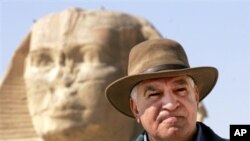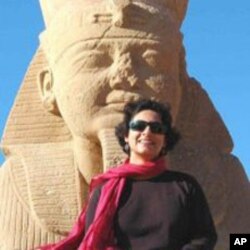The celebrated head of the Egypt’s Supreme Council of Antiquities, Zahi Hawass, has resigned. The man responsible for overseeing Egypt’s historical sites said he stepped down because many of the ancient sites are not being properly protected. Now, the new government is scrambling to replace the man who has become the worldwide face of Egyptian archaeology.
Zahi Hawass, known in some circles as “Egypt’s Indiana Jones,” was the head of the Supreme Council of Antiquities for nearly a decade. He was in many ways the face of Egyptian archaeology.
In late January, former Egyptian president Hosni Mubarak had elevated the SCA to a Cabinet level position with Hawass as its head.
But this week, Hawass said he was resigning. On his website, he said he was leaving because the Egyptian army could not protect all the ancient sites and no tourist police were available. That led to looting and damage of several heritage sites.
Hawass said the tomb of Hetep-ka at Saqqara, the tomb of Petah-Shepses at Abu Sir and the tomb of Em-pi at Giza had been damaged. Some storage magazines had also been attacked and several items looted. Hawass said he resigned because he could not stop the looting.
Salima Ikram is a professor of Egyptology at the American University in Cairo (AUC). She told VOA that some of the looting can be attributed to opportunists just looking for gold or other treasures. However, she added there is another group - armed thieves who break into sites and do irreparable damage.
Fayza Haikal, the former head of the Sociology, Anthropology, Psychology and Egyptology department at AUC, says Hawass did a lot to raise the profile of Egypt and increase tourism to the country. She is hopeful that Prime Minister Essam Sharaf’s new government will quickly move to protect ancient sites.
“If ever they had a doubt that something is happening, they call the police, they report to the police. And there are no police for the moment,” she said.
“I hope it will not be for very long because now the new administration, the new Cabinet is in place, so I hope that it will soon get active again and the monuments will be protected again,” Haikal added.
Haikal said that one way to prevent looting is for the world to refuse to buy plundered antiquities. She says anything that appears on the market for the next few years has to be suspect.
“To buy things is to encourage looting,” she said. “So I don’t know why the looters are doing that because I don’t think that they can really sell what they are taking now. But the one thing that is very, very important is that if there is no demand, there will be much less looting.”
Zahi Hawass was not without detractors. He was criticized for a domineering style and for boosting his own media profile. There were also protests about jobs and pay for Egyptologists in the country.
But he increased the salaries of SCA employees, offered medical benefits and was working on a union for archaeologists. He was also a staunch advocate for recovering plundered artifacts. During his tenure, 5,000 high-value antiquities were returned to Egypt.
Salima Ikram says Hawass’s academic credentials remain untarnished, and even though he is no longer the head of the Supreme Council of Antiquities, he will remain a powerful figure in archeology.
“So the idea that just because he is not in charge of the Supreme Council of Antiquities, he is not going to be an extremely active and perhaps even a more active member of the academic community is not a worry for us,” Ikram added.
Prime Minister Sharaf has appointed Emad Abou-Ghazi as the head of the Ministry of Culture. However, after several archaeologists demonstrated in Cairo, the Antiquities Department remains separate. Several names have been put forth to replace Hawass. Egyptologists, historians and archaeologists are hoping whoever succeeds “the Egyptian Indiana Jones” makes preserving and protecting ancient sites the top priority.





